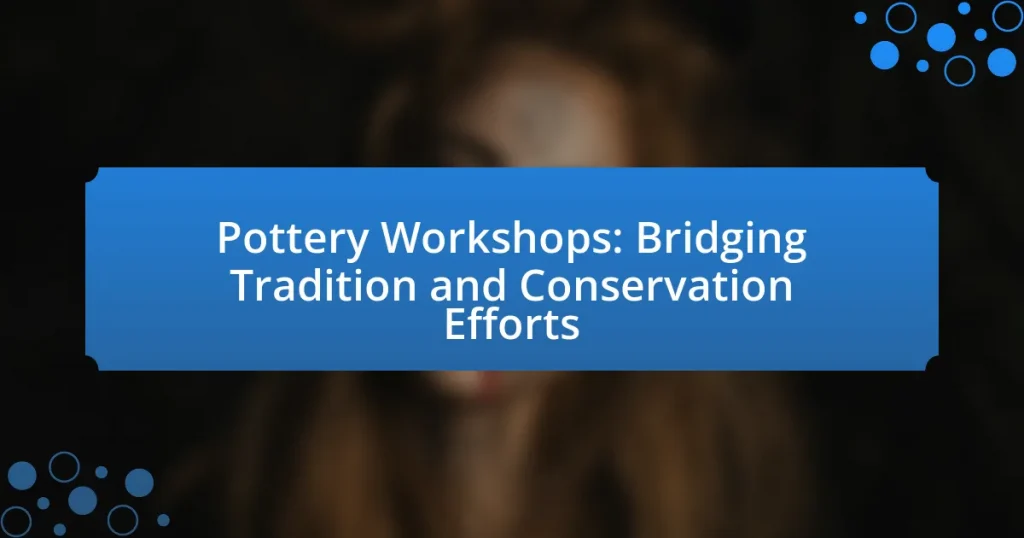Pottery workshops are specialized spaces dedicated to the art of creating ceramic objects through various techniques such as hand-building, wheel-throwing, and glazing. These workshops play a crucial role in preserving traditional pottery techniques, fostering community engagement, and promoting cultural heritage. They also contribute to local economies by supporting handmade crafts and attracting tourism. The article explores the significance of pottery workshops in cultural conservation, the traditional techniques they preserve, their impact on community engagement, and their role in promoting sustainable practices and environmental awareness. Additionally, it discusses the benefits participants gain from these workshops, including skill development, creativity enhancement, and therapeutic effects.

What are Pottery Workshops and Their Significance?
Pottery workshops are specialized spaces where individuals engage in the art of creating ceramic objects through techniques such as hand-building, wheel-throwing, and glazing. These workshops hold significant cultural and educational value, as they serve to preserve traditional pottery techniques while also fostering creativity and community engagement. For instance, pottery workshops often provide a platform for artisans to pass down skills and knowledge to new generations, ensuring the continuity of cultural heritage. Additionally, they contribute to local economies by promoting handmade crafts and attracting tourism, thereby bridging the gap between tradition and modern conservation efforts in the arts.
How do pottery workshops contribute to cultural heritage?
Pottery workshops contribute to cultural heritage by preserving traditional crafting techniques and fostering community engagement. These workshops often teach age-old methods passed down through generations, ensuring that unique cultural practices are not lost. For instance, in regions like Oaxaca, Mexico, pottery workshops maintain indigenous techniques that reflect the area’s history and identity. By engaging local artisans and participants, these workshops create a space for cultural exchange and education, reinforcing the significance of pottery as a cultural artifact. This active participation helps sustain local traditions and promotes awareness of cultural heritage among both locals and visitors.
What traditional techniques are preserved in pottery workshops?
Traditional techniques preserved in pottery workshops include hand-building, wheel-throwing, glazing, and firing methods. Hand-building involves shaping clay by hand, often using techniques like coiling and pinching, which have been practiced for thousands of years. Wheel-throwing, developed around 3500 BCE, allows for the creation of symmetrical forms and is a hallmark of traditional pottery. Glazing techniques, which enhance both aesthetics and functionality, have roots in ancient cultures, with specific recipes passed down through generations. Firing methods, such as pit firing and wood firing, are also retained, reflecting historical practices that influence the final appearance and durability of the pottery. These techniques are vital for maintaining cultural heritage and craftsmanship in pottery workshops.
How do pottery workshops foster community engagement?
Pottery workshops foster community engagement by providing a collaborative space where individuals can connect through shared creative experiences. These workshops encourage participants to work together, share techniques, and exchange ideas, thereby building relationships and a sense of belonging. Research indicates that community art programs, including pottery workshops, enhance social cohesion and promote cultural exchange, as evidenced by a study published in the Journal of Community Psychology, which found that such initiatives significantly increase community participation and strengthen local networks.
Why are pottery workshops important for conservation efforts?
Pottery workshops are important for conservation efforts because they promote the preservation of traditional crafting techniques and cultural heritage. By engaging communities in pottery-making, these workshops foster a deeper understanding of local materials and sustainable practices, which are essential for environmental conservation. For instance, studies have shown that traditional pottery techniques often utilize locally sourced clay and natural glazes, reducing reliance on industrial materials and minimizing ecological footprints. Additionally, pottery workshops serve as educational platforms, raising awareness about the importance of conserving both cultural and natural resources, thereby ensuring that future generations can appreciate and continue these practices.
What role do pottery workshops play in sustainable practices?
Pottery workshops play a crucial role in sustainable practices by promoting the use of eco-friendly materials and techniques. These workshops often emphasize the importance of local clay sources, reducing transportation emissions and supporting local economies. Additionally, many pottery workshops incorporate recycling practices, such as reusing clay scraps, which minimizes waste. Research indicates that traditional pottery methods, which are often taught in these workshops, have a lower environmental impact compared to industrial production, as they typically require less energy and utilize natural resources more efficiently.
How can pottery workshops promote environmental awareness?
Pottery workshops can promote environmental awareness by educating participants about sustainable practices in clay sourcing and firing techniques. These workshops often emphasize the importance of using locally sourced, non-toxic materials, which reduces the carbon footprint associated with transportation and harmful chemicals. Additionally, they can incorporate discussions on the environmental impact of traditional pottery methods versus modern techniques, highlighting the benefits of eco-friendly practices. For instance, workshops that utilize electric kilns instead of gas-fired kilns can significantly lower greenhouse gas emissions. By engaging participants in hands-on activities that reflect these principles, pottery workshops foster a deeper understanding of environmental stewardship and encourage sustainable habits in everyday life.

What Types of Pottery Workshops Exist?
Various types of pottery workshops exist, including hand-building workshops, wheel-throwing workshops, glazing workshops, and specialized workshops focusing on techniques like raku or sculptural pottery. Hand-building workshops emphasize techniques such as pinch, coil, and slab construction, allowing participants to create unique pieces without a potter’s wheel. Wheel-throwing workshops teach participants how to shape clay on a spinning wheel, a fundamental skill in pottery. Glazing workshops focus on the application and techniques of glazing, which is crucial for finishing pottery. Specialized workshops may delve into specific cultural techniques or artistic styles, such as Japanese raku, which involves a unique firing process. These workshops cater to various skill levels, from beginners to advanced potters, fostering both creativity and technical skill development.
How do different pottery workshops vary in focus and technique?
Different pottery workshops vary in focus and technique primarily based on their cultural heritage, intended purpose, and the materials they use. For instance, traditional workshops may emphasize hand-building techniques and local clay sources to preserve historical practices, while contemporary workshops often incorporate modern glazing methods and electric kilns for efficiency. Workshops focused on functional pottery prioritize usability and durability, whereas those dedicated to artistic expression may explore abstract forms and experimental techniques. This diversity reflects the broader trends in pottery, where cultural significance and innovation coexist, as evidenced by the varying styles seen in global pottery traditions, such as Japanese raku and Mexican Talavera.
What are the distinctions between traditional and contemporary pottery workshops?
Traditional pottery workshops focus on age-old techniques, often using hand-building methods and natural materials, while contemporary pottery workshops incorporate modern technology, diverse styles, and innovative materials. Traditional workshops emphasize cultural heritage and craftsmanship, often passing down skills through generations, whereas contemporary workshops prioritize artistic expression and experimentation, frequently blending various artistic influences. For example, traditional pottery may utilize local clay and traditional firing methods, while contemporary pottery might employ electric kilns and mixed media, reflecting current artistic trends and environmental considerations.
How do specialized workshops cater to different skill levels?
Specialized workshops cater to different skill levels by offering tailored instruction and resources that match participants’ abilities. For instance, beginner workshops focus on fundamental techniques and basic tools, while advanced sessions introduce complex methods and artistic concepts. This differentiation ensures that all participants, regardless of their experience, can engage meaningfully with the craft. Additionally, instructors often assess skill levels before the workshop begins, allowing for customized feedback and support throughout the sessions. Such structured approaches enhance learning outcomes and foster a more inclusive environment for all skill levels.
What materials and tools are commonly used in pottery workshops?
Common materials used in pottery workshops include clay, glazes, and various additives like grog or sand. Clay serves as the primary medium for shaping pottery, while glazes provide a decorative and protective finish after firing. Tools commonly utilized in these workshops consist of pottery wheels, hand tools such as ribs and trimming tools, and kilns for firing the finished pieces. The use of these materials and tools is essential for creating functional and artistic ceramic works, as evidenced by their longstanding presence in traditional pottery practices across cultures.
What types of clay are preferred in various pottery workshops?
Various pottery workshops prefer earthenware, stoneware, and porcelain clays due to their unique properties and versatility. Earthenware is favored for its workability and vibrant color options, making it ideal for decorative pieces. Stoneware is chosen for its durability and ability to withstand high temperatures, suitable for functional items like dinnerware. Porcelain is preferred for its fine texture and translucence, often used for high-end ceramics. These preferences are based on the specific needs of the pottery being created, as well as the desired aesthetic and functional qualities of the finished products.
How do tools and equipment influence the pottery-making process?
Tools and equipment significantly influence the pottery-making process by determining the efficiency, precision, and quality of the final product. For instance, the use of a potter’s wheel allows for uniform shaping of clay, which enhances symmetry and reduces the time required for hand-building techniques. Additionally, specialized tools such as rib tools and trimming tools enable artisans to refine their work, achieving intricate designs and smooth finishes. Historical evidence shows that advancements in pottery tools, such as the introduction of electric kilns, have improved firing consistency and reduced energy consumption, thereby increasing production rates and sustainability in pottery workshops.

How Can Participants Benefit from Pottery Workshops?
Participants can benefit from pottery workshops by enhancing their creativity, improving their fine motor skills, and fostering social connections. Engaging in pottery allows individuals to express themselves artistically while developing hand-eye coordination and dexterity through shaping and molding clay. Additionally, these workshops often create a community atmosphere, enabling participants to interact and collaborate with others, which can lead to lasting friendships and a sense of belonging. Research indicates that creative activities like pottery can also reduce stress and improve mental well-being, further highlighting the multifaceted benefits of participating in such workshops.
What skills can participants develop through pottery workshops?
Participants in pottery workshops can develop a variety of skills, including hand-eye coordination, creativity, and problem-solving abilities. These workshops require individuals to manipulate clay, which enhances fine motor skills and dexterity. Additionally, participants learn techniques such as wheel throwing, glazing, and firing, which foster artistic expression and technical knowledge. Engaging in pottery also encourages patience and perseverance, as the process often involves trial and error. Studies have shown that hands-on activities like pottery can improve cognitive functions and emotional well-being, making it a beneficial practice for personal development.
How does pottery making enhance creativity and self-expression?
Pottery making enhances creativity and self-expression by allowing individuals to manipulate materials and create unique forms that reflect their personal vision. The tactile experience of shaping clay fosters innovative thinking, as artists experiment with textures, colors, and designs. Research indicates that engaging in hands-on creative activities, such as pottery, stimulates brain areas associated with problem-solving and emotional expression, thereby promoting a deeper connection to one’s artistic identity. Additionally, pottery workshops often encourage collaboration and sharing of techniques, further enriching the creative process and enabling participants to express their individuality through their work.
What therapeutic benefits are associated with pottery workshops?
Pottery workshops offer therapeutic benefits such as stress relief, enhanced mindfulness, and improved fine motor skills. Engaging in the tactile process of shaping clay can reduce anxiety levels, as evidenced by studies showing that creative activities promote relaxation and emotional well-being. Additionally, the focus required in pottery encourages participants to be present in the moment, fostering mindfulness, which has been linked to better mental health outcomes. Furthermore, the act of manipulating clay can enhance dexterity and coordination, contributing to physical rehabilitation.
What are the best practices for engaging in pottery workshops?
The best practices for engaging in pottery workshops include actively participating in hands-on activities, maintaining an open mindset for learning, and collaborating with instructors and peers. Engaging in hands-on activities allows participants to develop practical skills and gain firsthand experience with techniques such as wheel throwing and hand-building. An open mindset fosters creativity and adaptability, essential for exploring various styles and methods in pottery. Collaboration enhances the learning experience, as sharing insights and techniques with others can lead to improved skills and innovative ideas. These practices are supported by educational research indicating that experiential learning and peer interaction significantly enhance skill acquisition in craft-based workshops.
How can participants prepare for their first pottery workshop experience?
Participants can prepare for their first pottery workshop experience by gathering essential materials and familiarizing themselves with basic pottery techniques. Bringing an apron, a notebook for taking notes, and any personal tools like a favorite sculpting tool can enhance the experience. Additionally, researching fundamental pottery methods, such as hand-building and wheel-throwing, can provide a foundational understanding that will be beneficial during the workshop. Engaging with online resources or beginner pottery books can also offer insights into the creative process and terminology used in pottery, ensuring participants feel more confident and informed.
What tips can enhance the learning experience in pottery workshops?
To enhance the learning experience in pottery workshops, participants should engage in hands-on practice, as tactile involvement significantly improves skill acquisition. Research indicates that active participation in craft activities, such as pottery, leads to better retention of techniques and concepts. Additionally, fostering a collaborative environment where participants can share feedback and ideas promotes creativity and problem-solving. Studies show that social interaction in learning settings enhances motivation and enjoyment, which are crucial for mastering pottery skills. Lastly, providing access to diverse resources, such as instructional videos and expert demonstrations, can cater to various learning styles and deepen understanding of pottery techniques.


